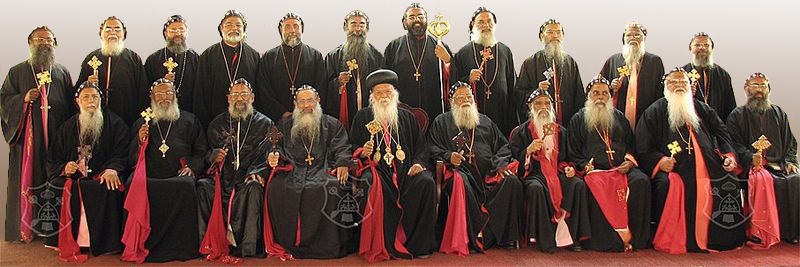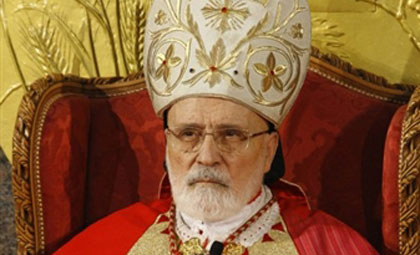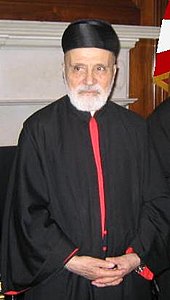
December 3974 - Mor Iwanis VII, the Patriarch of the Apostolic Department of Cildania, one of the component Churches of the Apostolic Church of the East, has called for a new Ecumenical Synod in the city of Qart Qildar, the first since the Church's only Ecumenical Synod, the one in Aldegaria in 3409. This historical event is a reaction to the numerous challenges and changes that the Apostolic Church faces, the dominant one being the Barmenian Schism of 3878 that subsides to this day in the Barmenian Church.
The Barmenian Schism was caused by theological and ecclesiastical controversies, especially concerning the relation between the humanity of Eliyahu and the divinity of the Spirit. Particularly, the Barmenian Church has adopted as official the position that there is no substantial difference between the incarnation of the Spirit of God as Eliyahu of Yishelem and the Henosis (union) that all faithful Hosians experience with God through His Spirit, in essence following a strongly anthropocentric Pneumatology by stressing Eliyahu's humanity. Although the Schism is now nearly a century old, the Apostolic Church of the East as a whole has so far not taken any position on this controversial issue, partly for political reasons, but also because the writings of Eastern Hosian Church Fathers are ambiguous on this matter. The Barmenian theological position does in fact have strong support in the writings of Mor Origen, a 13th century Cildanian Saint who is celebrated as one of the greatest theologians of Eastern Hosianism, and who wrote of "two qnome ("hypostases"), which are unmingled but everlastingly united in one parsopa ("person", "character", "identity")."
Terminology aside, the roots of the schism are more political than theological. The Barmenian Church founded under political pressure from King Consort Eksandr of Kathre, as way to enforce his rule over Barmenia as well as establish a state Church more palatable to the majority Ahmadi population. A more fundamental aspect of King Eksandr's reforms was his attack on the power of clergy, removing the Church from the authority of the Holy Synod, and essentially establishing a system of caesaropapism that continues to this day. In spite of these major reforms, the situation is far from clear. The Barmenian Church founded by King Eksandr remains in imperfect communion with the Apostolic Church of the East, while the Abba of Barmenia is the head of both the Barmenian Church and of the Barmenian Apostolic Church, the local autocephalous branch of the Apostolic Church of the East.
Because of the lack of a formal schism and due to the recent rapprochement between Cildania and Barmenia, both allies of Vanuku, Mor Iwanis VII and the Cildanian Church see this Ecumenical Synod as a way to restore full communion. Patriarch Iwanis has suggested a compromise theological formula and the end of the schism between the two Churches, a position that, whilst controversial, has plenty of support among Apostolic clergy and faithful throughout Terra, many of whom see such a compromise as being in line with tradition.
And again, beyond theological issues, this Ecumenical Synod is driven by politics. The Cildanian Church aims not only to achieve Cildanian-Barmenian reconciliation, but is also keen on having its central role in the worldwide Apostolic communion recognized. Of particular import to the Patriarch's motives behind calling for a new Synod is the desire of the Cildanian Church to gain ecclesiastical authority over Badara, especially now that the Badaran islands are under Cildanian military occupation. Since there has been no Patriarch of Badara since the anti-Hosian persecutions launched by the Ahmadi State nearly a century ago, and as most of the Badaran Apostolic population has taken refuge in Cildania, Mor Iwanis VII is likely to press for the unification of the two Churches under one Patriarch. Moreover, other areas with large Apostolic populations, mainly Pontesi and Aldegar, are ruled by pro-Trigunian regimes hostile to Cildania and inimical to the interests of the Apostolic Church. Mor Iwanis would then have a strong incentive to have the Synod grant greater power to the local Churches in Pontesi and Aldegar in exchange for their direct support for the Cildanian cause.
An Ecumenical Synod summoned by the Cildanian Patriarch is however very much out of character for the traditionally isolated and inward-looking Department of Cildania, which has largely ignored Eastern Hosian affairs outside its borders both before and after the Synod in Aldegaria. But in recent years the importance of the Cildanian Church has grown significantly. Being one of the largest and wealthiest Eastern Hosian Churches, the Department has in time come to see itself as having the right and duty to defend Apostolic interests Terra-wide. This newfound responsibility was particularly visible in the activities of the trans-national Apostolic Army in Majatra, a terrorist organization headquartered in Cildania and a major participant in Majatran affairs.
In light of this convergence of interests, it is likely that the Ecumenical Synod of Qart Qildar will result in the end of the Barmenian Schism, the adoption of a reformed Pneumatology (but also one that is deeply rooted in tradition), and much greater powers granted to the Pontesian and Aldegarian Churches. The Apostolic Church of the East will then have the means and the desire to become an international player to be reckoned with.



